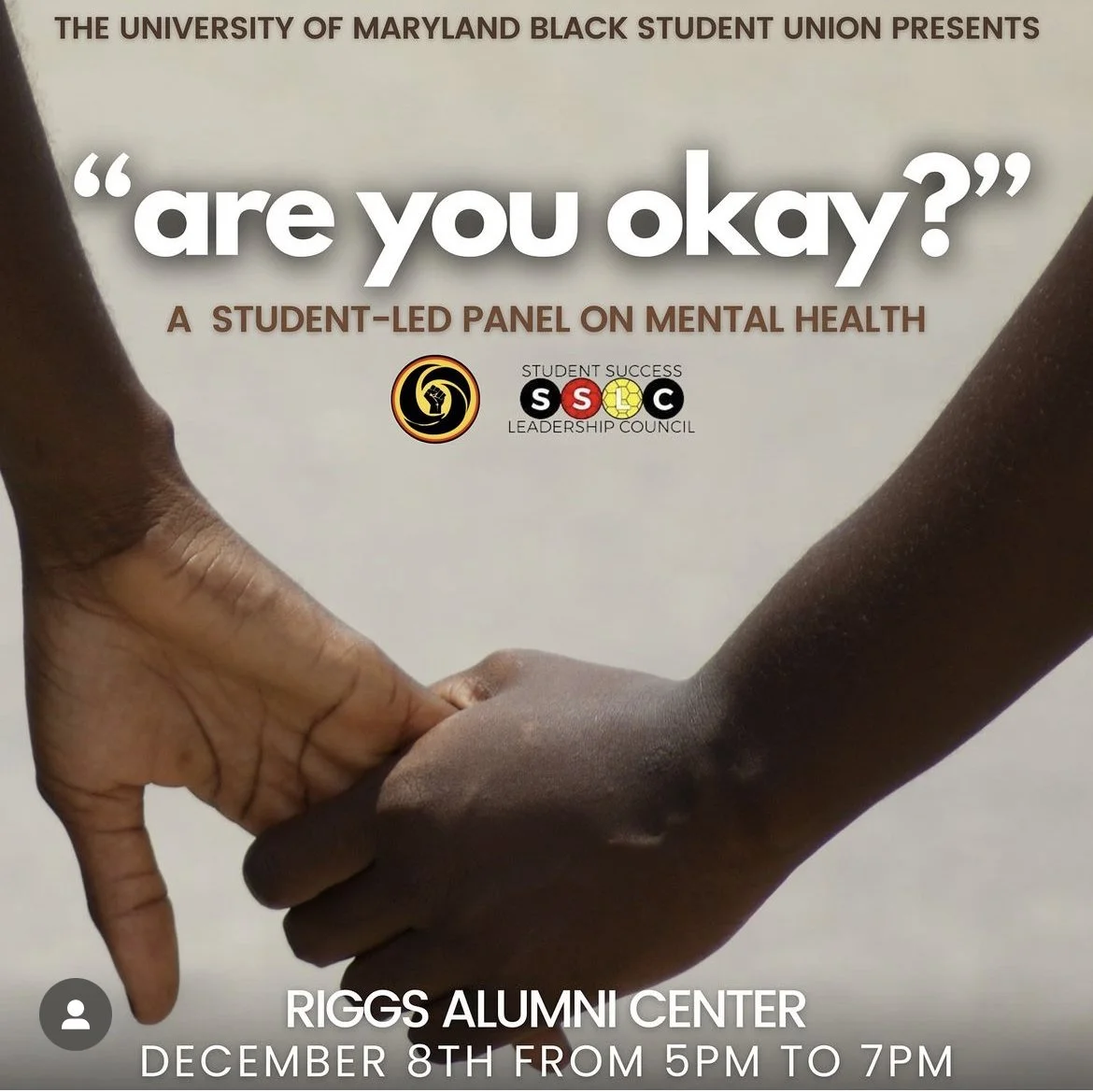BSU and SSLC discuss Black mental health at UMD
The event flyer for the panel on mental health. Courtesy of BSU and the SSLC.
The Black Student Union and Student Success Leadership Council called students to the Riggs Alumni Center Friday night to ask a simple question, “Are you okay?”
The resounding answer was “no” and the reasons were anything but simple.
The student-led panel on mental health took place just before the beginning of final exams, a time known to be stressful for many students. However, the event revealed Black students experience racial issues that exacerbate their stress during final exams.
Dr. Fanita Tyrell, assistant professor in the Department of Psychology and a faculty affiliate of the Department of African American Studies, moderated the discussion. The panel included Jodi Aryee, Autumn Ballard, Therman Hawkins III, Sydney Johnson, Cyan McDonald, Mason Minus, and Trevor Paige, BSU and SSLC executive board members.
Panelists discussed performance anxiety in the classroom and the culture shock of entering a predominantly white space, the struggle to gain visibility and recognition compared to their white counterparts, and the feeling of isolation from their peers.
Audience members echoed the same sentiments. Sophomore Bria Young was one of just two Black students in the atmospheric and oceanic science major last year.
“I attempted to go to a club meeting that was related to the major, and it kinda felt like I was a small ant in a room of 1000 people,” said Young. “It made me feel like I didn’t have a place in that community, which made me feel like I was kinda isolated academically.”
Young eventually switched her major.
Dr. Ronald Zeigler, director at the Nyumburu Cultural Center, said he experienced similar challenges and microaggressions as a student at the University of Maryland.
“But you should not let that deter you from your goals,” he said.
Zeigler encouraged students to use on-campus resources offered to them and seek relationships with their professors.
Yet, several students said they already tried to seek support regarding mental health from their professors and the counseling center. Their response left them even more discouraged.
Aryee, an information science major, shared that when she tried to use the eight free therapy sessions offered by the counseling center, staff immediately referred her to off-campus resources.
According to the counseling center’s website, their scope is limited and meant for students with short-term issues. Clients who showed persisting psychological challenges were in better hands with an off-campus provider.
“It just hurts sometimes because I was struggling. I failed three of my classes Freshman year because there was no support. There was no help,” said Aryee.
Other students said that professors say they value mental health, but based on their actions, they do not mean it. One example several students cited was professors’ reaction to a student suicide that occurred on campus earlier this fall.
Hawkins said a day after the incident, one of his professors told the class that he didn’t know why students would want to skip class. Minus claimed that in the days following the incident, some of his professors still had no clue the incident happened and had to be informed by students.
Areana Holder, a freshman information science major, said the victim was her friend. One of her professors emailed the class making it optional for students to miss class, but emphasized that they had an exam that week. So, the offer to skip class did not seem to be a genuine accommodation.
“I haven’t experienced a faculty that cares about my mental health,” said Holder.
According to her, professors also lacked care for her physical well-being. When Holder contracted COVID a couple of months ago, she said she followed university procedure and provided documentation to her professors. However, one professor still gave her zeros on the in-class assignments she missed while quarantining.
Students offered solutions to the faculty and administration at the event, including Dr. Georgina Dodge, vice president for diversity and inclusion.
Panelists suggested more diversity and empathy training for faculty, increased outreach to students, and more funding for student organizations that help Black students with this type of programming.
“If we as people, if we could, just uplift each other and continue to do stuff like this and bring each other joy. Then, we will be able to have the energy and have the strength to keep fighting that fight that we go through each day behind closed doors,” said Hawkins.

